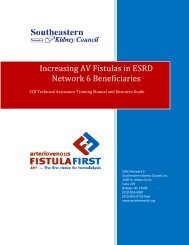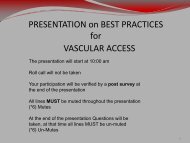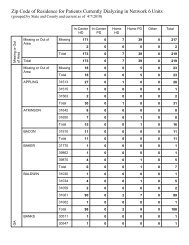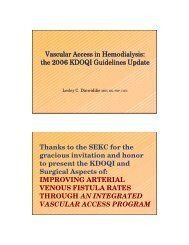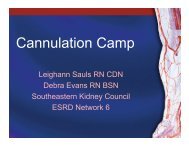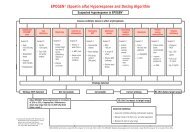ESRD NETWORK 6 2011 ANNUAL REPORT
ESRD NETWORK 6 2011 ANNUAL REPORT
ESRD NETWORK 6 2011 ANNUAL REPORT
You also want an ePaper? Increase the reach of your titles
YUMPU automatically turns print PDFs into web optimized ePapers that Google loves.
Technical AssistanceThe Southeastern Kidney Council provided technical assistance to facilities to improve datacollection, reliability and timeliness. In <strong>2011</strong>, staff responded to approximately 650 inquires forassistance. The CMS 2728 form generated 44% of technical assistance inquires.Staff conducted two Education Information Calls during the year to assist facilities withcompleting the CMS 2728, CMS 2746 and the Network Patient Activity Report. Approximately70 participants attended the calls.VISION and QualityNet Electronic Data SubmissionSoutheastern Kidney Council supported 22 facilities using Vital Information Systems to ImproveOutcomes in Nephrology (VISION) during 2010. Each year staff validates 3% of CMS-2728forms submitted via VISION for physician and patient signatures. In <strong>2011</strong>, VISION facilitiessubmitted 672 forms and both physician and patient signed 100% of the validated forms.Facilities use QualityNet Exchange to securely submit CMS 2728, 2746 and patient event data.In addition, dialysis facilities and CMS contractors use the system to submit other sensitive,patient-specific information to the Network. In <strong>2011</strong>, facilities submitted 468 CMS-2728 formsand 323 CMS’ 2746 forms via QualityNet ExchangeMaintenance and Security of CMS EnvironmentNetwork staff provided technical support to maintain CMS hardware, software and patient data.Tasks included:Network server maintenance: This included troubleshooting problems with systembackups, replications and conductivity issues. Manual system backups and replicationsperformed as needed.Remedy: System used to maintain an accurate inventory of hardware and software inthe CMS environment, track tickets submit to the CMS contractor regarding systembackups, replications, conductivity issues and security breachesSecurity Awareness Training (SAT): The Network Security Point of Contact (SPOC)ensured all staff completed Security Awareness Training. Upon completion of trainingstaff printed a certificate to demonstrate completion of the course. Once all trainingcertificates are completed, SPOC provided information to CMS indicating all staffcompleted the CMS required security training.Business Continuity and Contingency Plan (BCCP): Network staff maintains a BCCP toensure the contingency and disaster recovery in the event of disasters that threaten theoperation of the Network or the security of patient data. The BCCP updated withpertinent personnel and vendor changes during <strong>2011</strong>.P a g e | 87



